- Home
- Kay Hooper
Hold Back the Dark
Hold Back the Dark Read online
Titles by Kay Hooper
Bishop / Special Crimes Unit Novels
HAVEN
HOSTAGE
HAUNTED
FEAR THE DARK
WAIT FOR DARK
HOLD BACK THE DARK
The Bishop Files Novels
THE FIRST PROPHET
A DEADLY WEB
BERKLEY
An imprint of Penguin Random House LLC
375 Hudson Street, New York, New York 10014
Copyright © 2018 by Kay Hooper
Penguin Random House supports copyright. Copyright fuels creativity, encourages diverse voices, promotes free speech, and creates a vibrant culture. Thank you for buying an authorized edition of this book and for complying with copyright laws by not reproducing, scanning, or distributing any part of it in any form without permission. You are supporting writers and allowing Penguin Random House to continue to publish books for every reader.
BERKLEY is a registered trademark and the B colophon is a trademark of Penguin Random House LLC.
Library of Congress Cataloging-in-Publication Data
Names: Hooper, Kay, author.
Title: Hold back the dark / Kay Hooper.
Description: First edition. | New York : Berkley, 2018. | Series: A Bishop/SCU novel ; 6
Identifiers: LCCN 2017047809 | ISBN 9780425280959 (hardback) | ISBN 9780698194014 (ebook)
Subjects: | BISAC: FICTION / Suspense. | FICTION / Mystery & Detective / Police Procedural. | GSAFD: Mystery fiction. | Suspense fiction.
Classification: LCC PS3558.O587 H65 2018 | DDC 813/.54—dc23
LC record available at https://lccn.loc.gov/2017047809
First Edition: April 2018
Cover photography © Valentino Sani / Arcangel Images
Cover design by Rita Frangie
This is a work of fiction. Names, characters, places, and incidents either are the product of the author’s imagination or are used fictitiously, and any resemblance to actual persons, living or dead, business establishments, events, or locales is entirely coincidental.
Version_1
CONTENTS
TITLES BY KAY HOOPER
TITLE PAGE
COPYRIGHT
THE SUMMONS ONE
TWO
THREE
FOUR
FIVE
THE GATHERING SIX
THE DARKNESS SEVEN
EIGHT
NINE
TEN
ELEVEN
TWELVE
THIRTEEN
FOURTEEN
CHARACTER BIOS
PSYCHIC TERMS AND ABILITIES
AUTHOR’S NOTE
THE SUMMONS
In the middle of the journey of our life I came to myself within a dark wood where the straight way was lost.
—DANTE ALIGHIERI
ONE
TUESDAY, OCTOBER 7
Olivia Castle had experienced some monster headaches in her time, but this one, she felt sure, was about to make her head quite literally explode. It had come out of nowhere, as if something had just yanked her head into an invisible, tightening vise without warning. A vise with teeth. In pain, queasy, and shaking, she managed to lever herself up from the couch, holding one hand against the head she was sure was about to fall off, and hardly spared a moment to wonder why she’d been on the couch.
Work. She should have been at work.
Shouldn’t she be at work?
Had she come home for lunch? She didn’t remember.
Her head hurt too much to keep thinking about that.
She made it to the kitchen by holding on to various pieces of furniture as she passed, fighting nausea and accidentally grabbing Rex’s tail when she gripped the edge of the sink.
“Waaaurr!”
“Sorry, sorry,” she muttered, the headache so bad by then that her cat’s cry sounded like a dozen angry crows, her own quiet voice sounded like booming thunder in her head, and even her vision was affected in some way she didn’t understand; she couldn’t see the pleasant Vermont view normally visible from this window. She couldn’t see any real view at all.
She was seeing colors she was reasonably sure didn’t exist in nature. Or anywhere else, for that matter. Moving, swirling, like colorful smoke driven by a capricious breeze, opaque and translucent by turn. And everything was so damned bright. “Shouldn’t sit on the counter. How many times have I told you? Didn’t see you, pal. Oh, damn, what is going on?”
There was a large economy-sized bottle of an OTC painkiller near the sink (just as there was one in almost every room of her small house, and in her purse, with a box of extra bottles in the storage closet, in case the zombie apocalypse came without warning and all the pharmacies got looted before she could get to them). Olivia closed her eyes against the unnatural brightness, fumbling the bottle open while bitterly cursing childproof caps foisted upon people who had no children, fumbled just as blindly for a glass and the faucet, and managed, finally, to swallow about eight pills, hoping she could keep them down long enough to do some good.
“Prrupp,” Rex said.
“I know it’s too many, you don’t have to tell me that.” She stood there, eyes still closed, still hanging on to the edge of the sink with one hand and her head with the other, trying to breathe normally despite the pain keeping all her muscles rigid and snatching at her ability to breathe at all, her stomach churning, the weird colors still swirling even though her eyes were closed, wishing pain meds took effect faster. Like immediately. It would have been nice, she thought, to just take a shot of morphine and become unconscious for the duration. But she’d discovered the hard way that both the law and doctors frowned on patients self-medicating, far less walking out the door of any hospital, clinic, or pharmacy with their own supply of morphine or any other industrial-strength painkiller. And besides, they said it was only migraines.
Only migraines. Only migraines. Jesus. Even though no migraine remedy known to medical science and quite a few exotic possibilities Olivia had experimented with herself had so much as touched her periodic killer headaches.
She fumbled blindly for the bottle again.
“Waauurr!”
“All right, all right. I know there hasn’t been enough time. But if the pain doesn’t stop soon, I’m gonna take more. Shit.”
A moment later, Rex hissed.
Olivia managed to pry her eyes open no matter how much the ungodly brightness all around her hurt, and squinted at her cat in surprise. Because Rex didn’t hiss, or at least never had. But as she focused on her rather odd-looking cat, his brindle-tortie coat at odds with the brilliant blue eyes of a Siamese, she realized even through the bright, swirling colors she was still seeing that Rex was scared.
Really scared.
And Rex didn’t scare easily. Or . . . at all.
He was staring past her into the space behind her, the kitchen and den, and his pupils were so narrow that his eyes looked incredibly creepy, like the unnaturally blue eyes of a snake. The fur along his back was standing straight up, and his tail was about three times its natural size.
At the same time, Olivia began hearing a strange rustling sound. At first it sounded like dry leaves skittering along pavement, which was weird enough to hear inside her house with no pavement around. But then she realized it was . . . whispering. Lots of voices. Lots and lots of voices. Whispering.
It was coming from behind her.
Olivia did not want to turn around.
Her mouth was dry despite the nausea, her skin was crawling unpleasantly, the pain in her head was getting impossibly worse rather than better, and she was afraid if she turned to confront an axe murderer, she’d beg him to just cut off her head and be quick about it.
Axe murderer. Idiot.
Not an axe murderer, of course. Not anyone.
Not any one . . . thing. Because she heard more than one whisper, many whispers, countless whispers. And she didn’t know what they were saying, but she had the eerie feeling they were all whispering the same thing. The same words.
Still holding the edge of the sink with one hand, Olivia turned slowly to see what so frightened her cat and was making her own skin crawl in a sensation she’d never felt before.
“Oh, shit,” she whispered.
The headache that was still hellishly painful didn’t seem such a big deal now. Because despite all the swirling colors nearly blinding her, she could see, very clearly, why Rex was afraid. Every sharp object in her kitchen and den—every single one from every kitchen knife and fork she owned to three letter openers, two pairs of scissors, two box cutters with razor blades visible, the iron fireplace poker, and half a dozen pens and twice that many sharpened pencils—floated in midair. Different levels, some low, some as high as eye level.
With their pointy ends aimed right at her.
And they were all whispering.
“Waaurr,” Rex muttered, his voice unusually quiet, questioning.
“I’m not doing it. I’d know if I were doing it, right? I always know. I have to concentrate to do it. I mean, unless I’m mad. Angry, not crazy. Though maybe crazy too. Because this has never . . . And, anyway, even if I’m mad, I don’t . . . know how . . . to make anything . . . whisper.”
Or how to stop it when she instinctively tried, an effort that was definitely not rewarded.
Unconsciously, both her hands lifted to her head, pressing as if to hold something in, because the headache suddenly grew horribly worse, impossibly worse, dragging a guttural groan from somewhere deep inside her, and through the bright swirl of colors that was beginning to truly blind her, she could still see all the scary-sharp weapons floating inexorably toward her.
Whispering.
What was whispering? Inanimate objects couldn’t communicate, right? Not like this, at least.
The pain edged into agony, but even so she heard as if from a great distance her own shaking, pleading question.
“What? What are you saying? What do you want of me?”
And from the same great distance, she heard the whispered demand that made no sense to her.
Prosperity. Go to Prosperity.
They were still floating eerily toward her, all the pointy things that promised even more pain if they came much closer, and hard as she tried, Olivia couldn’t do anything about it, couldn’t stop it, couldn’t see anything but them or hear anything except for that whispered demand.
Go to Prosperity.
Go to Prosperity.
Olivia heard one last thing: A moan of agony escaped her, and then everything went black.
* * *
• • •
TUESDAY, OCTOBER 7
Logan Alexander considered himself a man of hardheaded practicality, which to his way of thinking was ironclad proof that the universe had a twisted sense of humor. Because he was also a medium.
A medium.
And he hated being a medium. He hated being called a medium, being dragged from peaceful obscurity into an unwelcome spotlight of sorts, what he was and what he could do named if not understood, word spreading among those who scorned with suspicion and those who believed or desperately wanted to. Both always, always finding him eventually and making his life hell so that he’d have to pull up stakes again, usually in the middle of the night, and find another place to live, in another town or city or state where he could be anonymous again, just another stranger and left in peace. Until the next time he was found, and the lost ones began to seek him out again.
Not the “Can you contact my uncle George and ask him where he hid all the family money?” sort of questions that only made him impatient. Those were relatively easy to either avoid or else respond to with some bullshit answer that would satisfy the sort of people who would even ask that kind of silly question.
It was the truly lost ones that got to him, the religious who had lost their faith and needed proof of some kind of an existence after death. The parents hollow-eyed and haunted in a very human sense by the inexplicable and heartbreaking disappearance of a child. The widows and widowers bereft by the loss of the other half of themselves. And others, so many others, lost people who were desperately hopeful that he could help them.
He hated it.
But what he hated most about an ability way too many people with no understanding of what they were talking about called a gift or a curse (as if it could be anything so simple as either) was that he had absolutely no control over it. And he had been told by someone who did understand and should certainly know all about it that the “door” most mediums opened in order to communicate with the dead was, in him, always open.
Always. Or, hell, just missing entirely.
And also that mediums naturally attracted spirits. Whether they wanted to or not.
He didn’t talk to the dead, certainly not willingly. They talked to him. Anywhere. Everywhere. No matter how hard he tried to ignore them. Persistent, insistent, often desperate. Dogging his steps. Showing up in different places. Making it impossible for him to go out to dinner, or to a theater and enjoy a play or movie. Impossible to attend a party, or even to date—or at least date the same woman more than once.
He’d learned that lesson the hard way, with too many first dates ending with a woman eyeing him uneasily because he’d spent too much time sending brief, fierce glares at nothing she could see past her shoulder or over her head, or at the empty chair at their table. Most were either too kind or too wary to say it aloud, but at least one date had told him frankly that she didn’t see the sense in a second date since it was obvious he had more baggage than she did and she wasn’t getting any younger.
And the last time an instant physical attraction had cut an evening short for energetic (if not desperate) sex in his bed, the lady had left before dawn after waking to find him sitting up in bed having a whispered but clearly angry argument with someone named Josephine.
His bedmate’s name wasn’t Josephine, he was wide-awake—and as far as the lady could see, nobody else was in the room. So she snatched up her clothing and ran.
Logan had not blamed her one bit. He was just grateful that she hadn’t called the police to report an escaped lunatic.
At least a few before her had done something of the sort over the years, reporting him as potentially dangerous, or mentally ill, or just a man who had frightened them in an age when police were finally paying more attention to that sort of thing, leaving him to spend time in this jail or that “detention room” or in some clinic or other while the police and sometimes doctors got things sorted out to their satisfaction in the quest to determine whether he was actually a danger—to himself or others. Sometimes there were fines, sometimes an order for a psychiatric evaluation.
All because he could see and talk to the dead.
They stole any chance he had of living a normal life, these spirits, and while his sympathy was sometimes roused by a particularly sad or frightened spirit killed in some brutally unfair manner and desperate for his help, he seldom could do anything to help them, and that only added to his resentment.
At least most of them had had a shot at a normal life, before whatever unfair act or illness or accident had put them in the ground. Logan, on the other hand, could hardly get a normal day to himself. Impossible to do everyday things. Wherever he went, whatever he was doing, there was at least one dead person anxious to talk to him.
Like now. He was just blamelessly walking in the park near his current home in San Francisco, needing some morning air before he returned to the freelance IT work he did from his home office, because of course he couldn’t work in a normal office setting with people all around him.
Besides, even the living had begun to wear on his nerves after a while.
Maybe especially the living.
He’d just wanted some air, that was all. And there was a dead guy walking beside him. Talking to him.
“She didn’t mean to poison me, I’m sure,” the older gentleman of about sixty was saying earnestly, for about the third time.
Logan paused on an arched footbridge and leaned his elbows on the wooden railing, gazing down at the happily burbling, man-made creek. A quick glance had shown him no one else was near, but he still kept his voice low; bitter experience had taught him that, as with dates, office jobs, and lovers, speaking aloud in public to people only he could see whenever normal people were within earshot too often meant a quick trip to the nearest loony bin, or at least a night in a cell.
Adding insult to injury, the cells too were always filled with dead people. Usually far more hostile than his living cellmates.
“Listen, buddy—”
“My name is Oscar.”
Logan didn’t bother telling him names didn’t really matter. “Oscar, I don’t know if your wife poisoned you—”
“My girlfriend.”
Logan sent him a glance, mildly surprised, but shrugged. “Whatever. I don’t know if she poisoned you, but if you’re looking for justice, I can tell you from experience that cops take a dim view of dead witnesses communicating through mediums, and judges take an even dimmer view. And I’ve had more than my fair share of time on a shrink’s couch, thank you very much.”
“But—”
“Were you buried or cremated?”
“Cremated.”
“Then you’re really out of luck.”
“The medical examiner took samples. Of . . . of everything. I saw him.” He sounded, suddenly, a bit queasy.

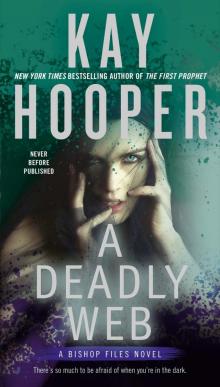 A Deadly Web
A Deadly Web Raven on the Wing
Raven on the Wing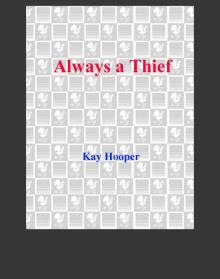 Always a Thief
Always a Thief Star-Crossed Lovers
Star-Crossed Lovers Blood Dreams
Blood Dreams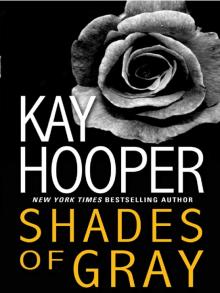 Shades of Gray
Shades of Gray Rebel Waltz
Rebel Waltz Chill of Fear
Chill of Fear Sleeping With Fear
Sleeping With Fear After Caroline
After Caroline Time After Time
Time After Time Haunting Rachel
Haunting Rachel Hunting Fear
Hunting Fear Out of the Shadows
Out of the Shadows Whisper of Evil
Whisper of Evil Blood Sins
Blood Sins Hiding in the Shadows
Hiding in the Shadows C.J.'s Fate C.J.'s Fate C.J.'s Fate
C.J.'s Fate C.J.'s Fate C.J.'s Fate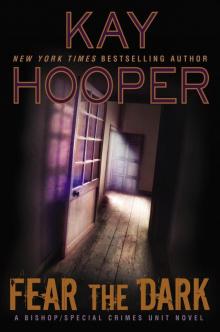 Fear the Dark
Fear the Dark Illegal Possession
Illegal Possession Stealing Shadows
Stealing Shadows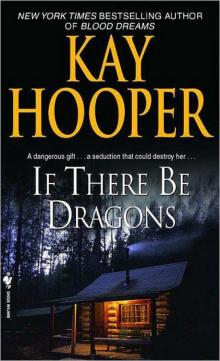 If There Be Dragons
If There Be Dragons Once a Thief
Once a Thief In Serena's Web
In Serena's Web On Wings of Magic on Wings of Magic
On Wings of Magic on Wings of Magic Hostage
Hostage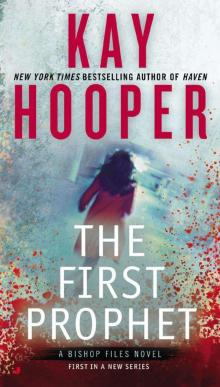 The First Prophet
The First Prophet Through the Looking Glass
Through the Looking Glass Golden Flames
Golden Flames Finding Laura
Finding Laura Haven
Haven The Haviland Touch
The Haviland Touch The Lady and the Lion
The Lady and the Lion Haunted
Haunted Velvet Ligntning
Velvet Ligntning Blood Ties
Blood Ties Adelaide, the Enchantress
Adelaide, the Enchantress The Matchmaker
The Matchmaker Golden Threads
Golden Threads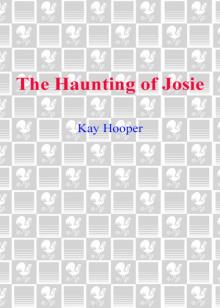 The Haunting of Josie
The Haunting of Josie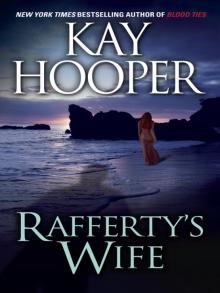 Rafferty's Wife
Rafferty's Wife Amanda
Amanda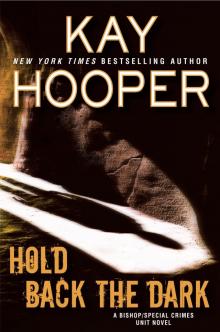 Hold Back the Dark
Hold Back the Dark Sense of Evil
Sense of Evil What Dreams May Come
What Dreams May Come Larger Than Life
Larger Than Life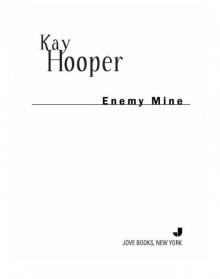 Enemy Mine
Enemy Mine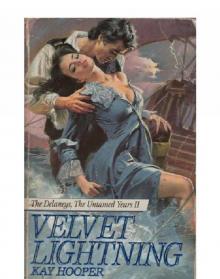 Velvet Lightning
Velvet Lightning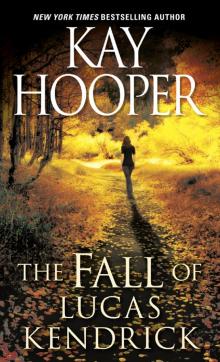 The Fall of Lucas Kendrick
The Fall of Lucas Kendrick Aces High
Aces High Captain's Paradise: A Novel
Captain's Paradise: A Novel The Wizard of Seattle
The Wizard of Seattle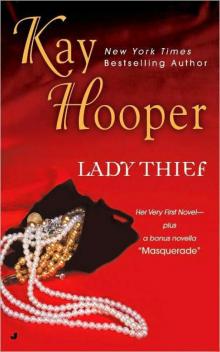 Lady Thief
Lady Thief Summer of the Unicorn
Summer of the Unicorn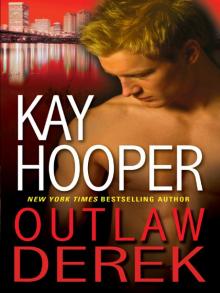 Outlaw Derek
Outlaw Derek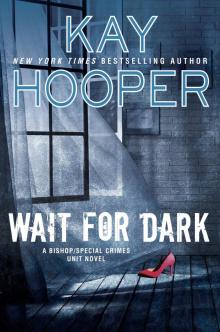 Wait for Dark
Wait for Dark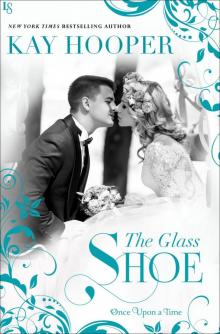 The Glass Shoe
The Glass Shoe It Takes a Thief
It Takes a Thief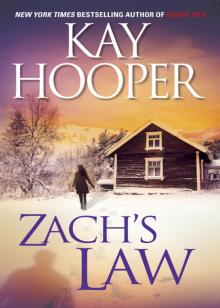 Zach's Law
Zach's Law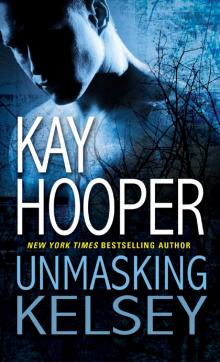 Unmasking Kelsey
Unmasking Kelsey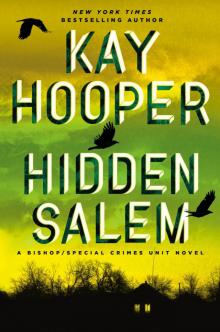 Hidden Salem
Hidden Salem